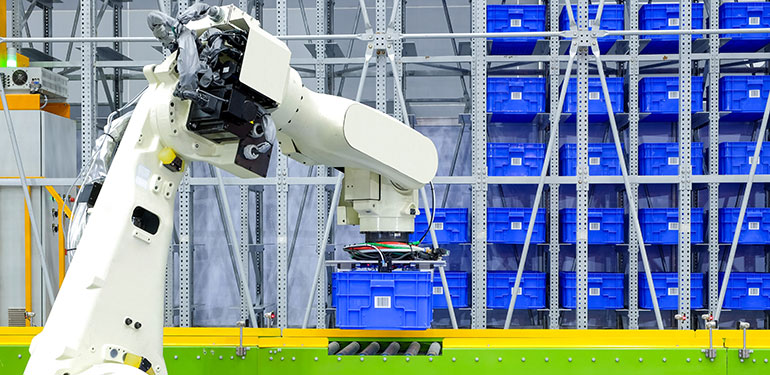Overview / Careers in RoboticsRobotics Careers in Retail and Warehouse
With more purchasing shifting online, the importance of warehouses and distribution continues to increase. Due to the repetitive labor involved, robots are key to solving some massive logistical challenges in a cost-effective manner. However, sensing and grasping the variety of goods that can be purchased online remains a major challenge. For retail stores, robots have the potential to improve the in-store experience by maintaining stocked shelves and cleaning the environment.
How would a roboticist function in this industry?
Retail robotics is all about efficiency. Can already highly systemized and controlled processes be automated? Engineers in this field obsess about moving the right products to the right places as quickly and safely as possible. Roboticists who specialize in this area have the opportunity to work with robots that function alongside humans, as well as create completely automated end-to-end solutions that can help improve processes.
How does MSR prepare students for this field?
Robots in retail and warehouse settings need to be able to both move and pick up items. MSR students have access to multiple mobile-manipulation platforms and can develop hands-on-experience that can differentiate them when entering the job market.
How is robotics used / applied in this industry?
Robotics in either retail or warehouse settings are often used to stack or unstack palettes, load or unload containers, and pick up or put down bins or packages.
Where our students have interned or our alumni have worked
- Amazon
- Berkshire Grey
- Brain Corp
- Corvus Robotics
- Fetch Robotics
- OneTrack
- Outrider
- PINC
- Vecna Robotics
- Zebra Technologies
Featured Alumni

Tanay Choudhary
MSR '16, Senior robotics software engineer, Vecna RoboticsThe Vecna Robotics website states that "workflows are the engine of every business that deals with physical goods: from distribution to wholesale, retail to manufacturing."
While many companies associate workflows with automation, Vecna Robotics looks beyond automation to "focus on continually maximizing human and robot performance in the workflow to enhance your flexibility, productivity, and achieve a sustained competitive advantage." Tanay Choudhary supports that mission as a senior robotics software engineer, writing code for the algorithms that make robots autonomous.
In addition to coding what he calls the "brains" of robots, Choudhary is involved with design discussions that allow him to come up with creative ways to overcome obstacles in a project from a software perspective.

Jordan Haskel
MSR '19, Software engineer at Brain CorpJordan Haskel has heard all the concerns about robots replacing people in the workforce, particularly in the retail and warehouse spaces. While some jobs might be lost to automation, Haskel believes robots are being developed to help people, not replace them.
"Most robots, especially the ones we work on, are intended to make current humans' jobs easier, allowing them to do more meaningful, less tedious work," Haskel said.
At Brain Corp., Haskel helps develop autonomous solutions that help businesses turn manually-driven products into intelligent machines, often for cleaning or delivery purposes. Each day brings a new challenge, but that's what Haskel enjoys about the job.
"Making a reliable, effective robot is really difficult," he said, "but that is also a really great part of working in robotics."


